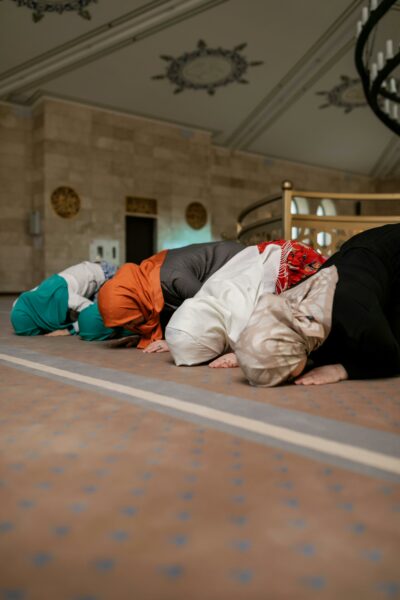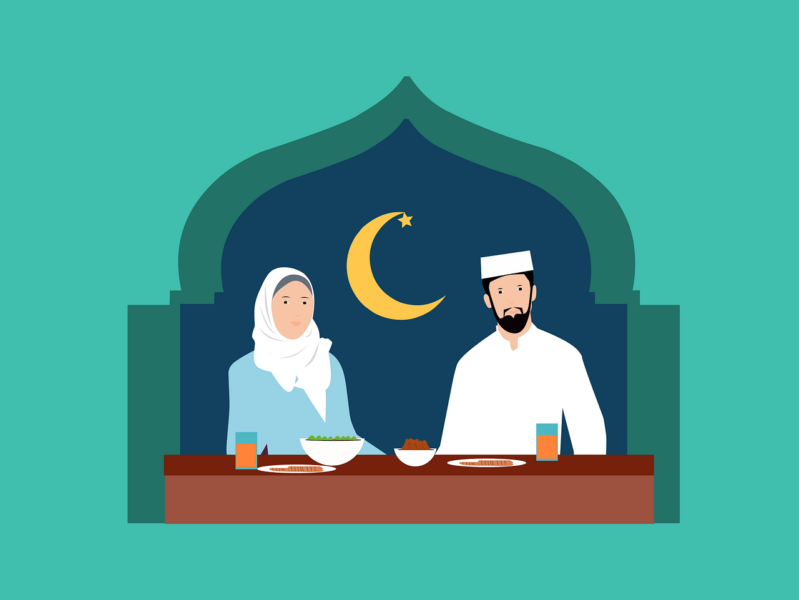It’s International Women’s Day and with Ramadhan a few days away, our thoughts naturally turn to a woman’s experience of Ramadhan, her role, the challenges she may face, and the blessings she brings.
When Ramadhan arrives, we all pocket the spiritual blessings that descend. We feel the mercy that envelops our homes and connects us. But it’s plain to see that Ramadhan, although equal to all believers, is a different experience for each of us, depending on your age, gender, and life experience. We’re going to focus solely on gender today, and how it is for a Muslim woman navigating the holy month.

Special Iftar Service
Predominantly, the role of taking care of the fasting family often falls on the female within a home. It’s a memory most of us share, of our mother’s scurrying around moments before iftar making sure there’s enough to feed both your family and the whole of the neighbourhood.
There’s a huge emphasis on what we’re going to eat in Ramadhan and rightfully so. We’ve refrained from food all day and we’re spoilt for choice. But the problem lies when the food you’re consuming is far too elaborate, going to waste and taking too much time.
Those who prepare food for their feeding family and take care of them should not feel as though their time is going to waste, as feeding a fasting person comes with great reward, and with the correct intention each of your household chores can be rewarded too.
The Prophet (saw) said: “Whoever provides the food for a fasting person to break his fast with, then for him is the same reward as his (the fasting person’s), without anything being diminished from the reward of the fasting person.” (at-Tirmidhi)
It’s about finding the balance of taking care of your loved ones during the holy month, but also not going overboard where it becomes excessive. The Prophet (saw) ate simple, nutritious foods such as dates and olives. He didn’t indulge in eating meat daily and would be content with the food he ate.
If you want the reward of feeding the fasting person, you don’t always have to entertain or socialise, you can gain this reward in a less time-consuming way such as donating food for mosque iftars or paying towards one. You can also share food or give food parcels to your local community and neighbours, or even to local food banks or soup kitchens.
Abu al-Siwar al-‘Adawi said: “Men from the tribe of Banu ‘Adiyy… would take their food out to the mosque and eat with the people, and the people would eat with them.”

A Pillar of Society
Muslim women, both within their household and outside of it, are pillars of the community. They are known to be generous in their charity and their active role within their local circles and projects. Ramadhan does not inhibit them: with communal iftars, charity work, and fundraising, it’s often the women that take centre stage and lead the race.
It’s a reminder that your role as a Muslim woman isn’t tied only to the traditional setting of a kitchen. Although fulfilling your household details does come with great rewards and benefits, there’s also scope for a woman to join in earning her rewards as a pillar of a community in Ramadhan.
Go along with your family or other sisters to congregational tarawih or jumu’ah prayers to taste the unity of Ramadhan. Use this time to connect with and greet other Muslim women to share the spirit and love of the month.
Given we’ve got a few days until Ramadhan, take some time to set your own routine for your Ibadah during the holy month. Allocate a portion of your day where you will focus solely on it be it reading Quran or listening to lectures. Add this into your lifestyle throughout the month, and it will be easier to continue after the month ends.

Setting an example
Within your household, your children and family members will look to you for guidance and insight. Make your little ones excited for the previous month by setting them a routine to join you in. It’s the little traditions that will stick with them.
Encourage your children and spouse to join you to reflect on their Ramadhan every so often. Your nurturing and gentle manner as their mother or spouse helps them feel comforted and at ease. Lean in on that and make them feel the warmth of Ramadhan, where we come to together.
Your role as a mother is pinnacle and important as mentioned in the Quran. “And your Lord has decreed that you not worship except Him, and to parents, good treatment. Whether one or both of them reach old age [while] with you, say not to them [so much as], ‘uff,’ and do not repel them but speak to them a noble word.” (Qur’an 17:23)
The household chores shouldn’t only fall on you. Get your children involved in household activities by setting a rota for things such as cleaning up or doing the dishes. This instills the value of helping around the house.
You can also set the example of the importance of being dutiful to your parents by reaching out to your own when possible. Visit them with your own family, and keep bonds connected.
If you would like to join in our Race to Jannah Campaign and represent your region, then join us this Ramadhan. If you have children, it’s an even better way to get them involved and set a positive example and leave behind a legacy for yourself. Sign up here.
Being excused is not an excuse
During Ramadhan, there will be times that you will be exempt from fasting and praying as a woman. Sometimes it may feel like you’re unable to fully take full advantage of the month if you’re restricted from acts. However, you can use that time to focus on other acts of Ibadah such as dhikr and du’a. Take advantage of the best times such as the final hour of jumu’ah and the last part of the night. By getting up at this time to make du’a, you help to maintain your usual night routine, even if you cannot pray at this time. You can also use this time to read the tafsir of the Qur’an and reflect on its meanings and lessons.
During these days, you can also be of service to those who are fasting and earn rewards this way.
Rather than perceiving it as you being deprived, reflect on the mercy of Allah in allowing your body time to rest and recover, whilst still giving you the opportunity to earn the rewards of what you would do when you are in better health. The break can also be used to make the time when you are fasting easier. Catch up on other chores or things you may have to do and plan to make the best use of your time.
Plan ahead
The month will whizz by without you noticing so it’s important you’re productive and managing your time effectively. Aim to do any activities that you can, pre-Ramadhan, such as prepping your Eid gifts, a Ramadhan spring clean, and a food shop. Ticking all of these things off your list prior to Ramadhan starting, will give you a much-needed head start.
If you can meal prep ahead of time, and or plan your recipes this will lift a huge weight off your shoulders. This will remove the daily worry of what you’re consuming for iftar. You also don’t want to miss out on your giving throughout the month, especially the last ten days.
You can make sure you don’t miss out by automating your giving with us, both your Sadaqah and Zakat. AutoNate this Ramadhan, and that’s one thing sorted for you before the month begins.

A reminder for Ramadhan
With Ramadhan fast approaching it’s a reminder to all the Muslim sisters out there that you’ve got this. You are a cherished and pinnacle component for your household, the ummah, and the world.
“Women are half the Ummah and they give birth to the other half, so they are the whole Ummah.” (Ibn al Qayyim)
Though it may often feel that it goes overlooked and unappreciated, your role and the effort you put in daily are recorded by the angels, and greatly rewarded. May Allah continue to bless your efforts, elevate you in this world and the hereafter, and make this Ramadhan one where you strive towards Him. Ameen.